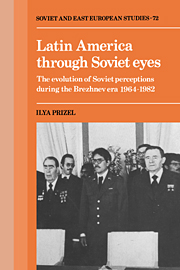 Latin America through Soviet Eyes
Latin America through Soviet Eyes Book contents
- Frontmatter
- Contents
- Preface
- Acknowledgments
- Introduction
- Part I Soviet perceptions of Latin America's global role
- Introduction
- 1 Soviet perceptions of US–Latin American relations
- 2 Latin America's role in the capitalist division of labor
- 3 Latin America's role in the Third World
- 4 Soviet views on Latin America's regional integration
- 5 Soviet conclusions regarding Latin America's ability to conduct an independent foreign policy
- Part II Soviet perceptions of Latin American social structures
- Part III Soviet–Latin American relations during the Brezhnev era
- Part IV Conclusion: the emerging Soviet perception of Latin America and the future of Soviet policy toward the hemisphere
- Conclusions
- Epilogue – Latin America: the Long March
- Notes
- Bibliography
- Index
5 - Soviet conclusions regarding Latin America's ability to conduct an independent foreign policy
Published online by Cambridge University Press: 05 February 2012
- Frontmatter
- Contents
- Preface
- Acknowledgments
- Introduction
- Part I Soviet perceptions of Latin America's global role
- Introduction
- 1 Soviet perceptions of US–Latin American relations
- 2 Latin America's role in the capitalist division of labor
- 3 Latin America's role in the Third World
- 4 Soviet views on Latin America's regional integration
- 5 Soviet conclusions regarding Latin America's ability to conduct an independent foreign policy
- Part II Soviet perceptions of Latin American social structures
- Part III Soviet–Latin American relations during the Brezhnev era
- Part IV Conclusion: the emerging Soviet perception of Latin America and the future of Soviet policy toward the hemisphere
- Conclusions
- Epilogue – Latin America: the Long March
- Notes
- Bibliography
- Index
Summary
Although by the early 1980s Latin America had clearly ceased to fit Stalin's description of a “collection of US satellites,” it was equally clear that Latin America had yet to find a new niche in the international system. Soviet analysts recognized that despite Latin America's increased efforts to loosen its chronic dependence on the United States, either by expanding its regional integration, by establishing closer ties with other centers of the developed capitalist world, or by assuming a leading role within the Third World, none of these efforts was sufficiently successful to offset the region's dependence on the United States.
But did economic dependence preclude the ability to conduct an independent foreign policy? To decide that such was not the case would be a significant departure from the traditional Soviet-Marxist line, which insisted on purely economic determinism. It can be considered unusual that Karen Brutents noted that although the Third World countries continue to hold a:
dependent and exploited position in the world capitalist economy [which]…defines their relation to imperialism…nevertheless they [the Third World countries] ought to be characterized on the whole as anti-imperialist and anti-colonial, capable of limiting the influence of imperialism.
The Academy of Sciences held a conference; the root issue was whether Latin America's global posture had truly changed or whether it remained the same, albeit camouflaged with outbursts of nationalistic and anti-US rhetoric.
- Type
- Chapter
- Information
- Latin America through Soviet EyesThe Evolution of Soviet Perceptions during the Brezhnev Era 1964–1982, pp. 63 - 66Publisher: Cambridge University PressPrint publication year: 1990


